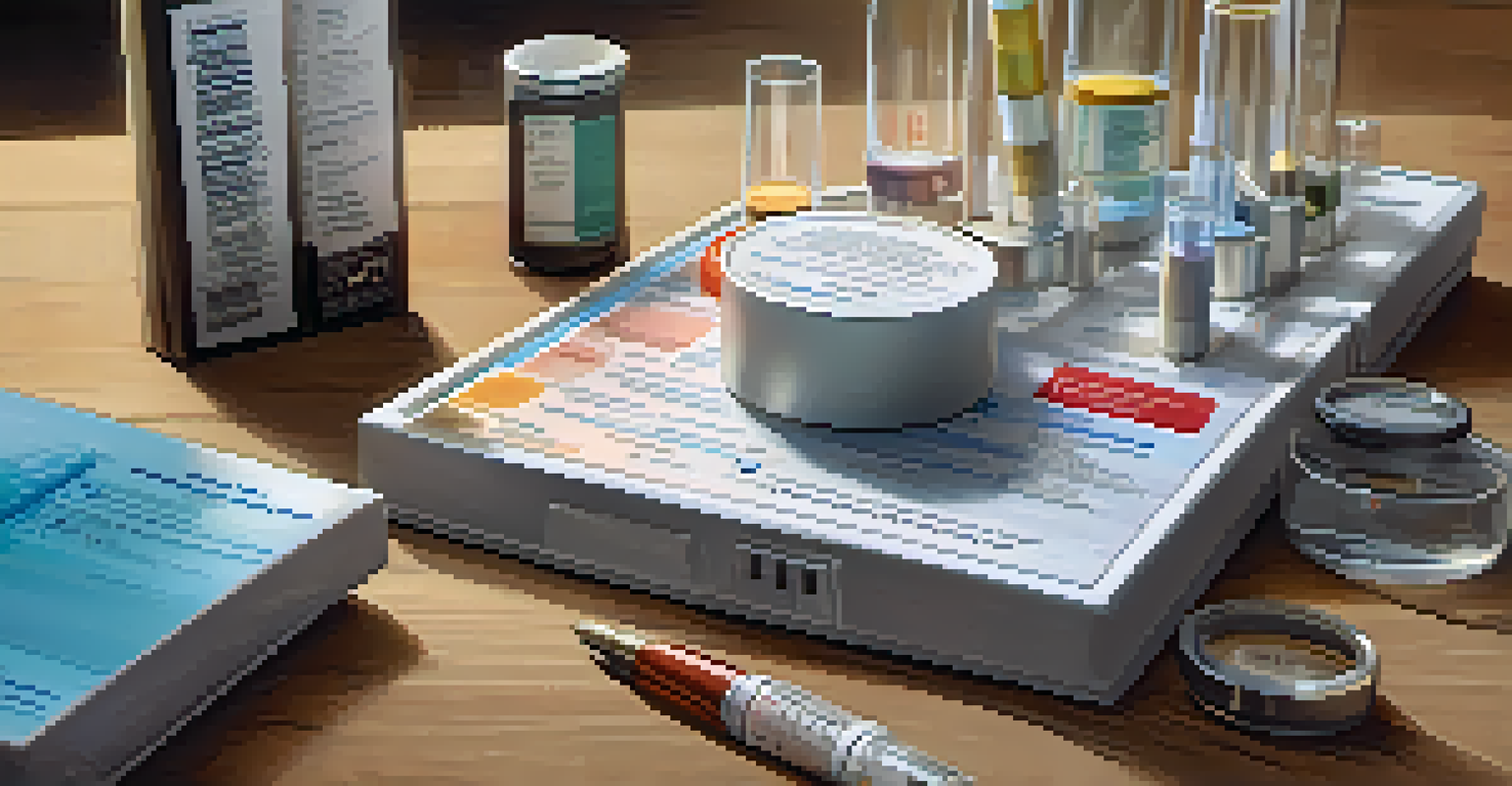Understanding Rare Genetic Disorders and Their Treatment Options

What Are Rare Genetic Disorders and Their Prevalence?
Rare genetic disorders are conditions caused by abnormalities in genes, affecting a small percentage of the population. While each disorder might be rare, collectively, there are thousands of them, impacting millions worldwide. For example, cystic fibrosis and Huntington's disease are well-known, yet many people have never heard of disorders like Angelman syndrome or Ehlers-Danlos syndrome.
Awareness is the first step in the journey towards understanding and treatment of rare genetic disorders.
The rarity of these disorders often leads to a lack of awareness and understanding, which can make diagnosis and treatment challenging. Patients may visit multiple specialists before receiving a correct diagnosis, which can take years. The prevalence of these conditions varies, but they are generally defined as disorders affecting fewer than 200,000 individuals in the U.S.
Understanding the prevalence of rare genetic disorders is crucial for research funding and awareness campaigns. The more we know, the better equipped we are to support affected individuals and families, ensuring they have access to necessary resources and treatment options.
Common Symptoms of Rare Genetic Disorders
Symptoms of rare genetic disorders can vary widely, depending on the specific condition and the genes involved. Some common symptoms include developmental delays, physical abnormalities, and chronic health issues. For instance, individuals with Marfan syndrome may experience cardiovascular problems and tall stature, while those with phenylketonuria (PKU) may struggle with intellectual disabilities if untreated.

Many symptoms can overlap between different disorders, which complicates diagnosis. For example, both Tay-Sachs disease and Pompe disease can lead to muscle weakness, but they stem from different genetic mutations. This similarity can lead to misdiagnosis or delayed treatment, emphasizing the need for specialized testing.
Rare Disorders Affect Many Globally
While each rare genetic disorder affects a small number of individuals, collectively, they impact millions of people around the world.
Recognizing the signs early on is key to managing these disorders effectively. Parents and caregivers should be aware of any unusual symptoms in children and consult healthcare providers for further evaluation. Early intervention can lead to better outcomes and improved quality of life.
How Are Rare Genetic Disorders Diagnosed?
Diagnosing rare genetic disorders often involves a complex process that includes a detailed medical history, physical examination, and genetic testing. Physicians may order specific tests to identify genetic mutations or chromosomal abnormalities. For example, whole exome sequencing can provide insights into a patient's genetic makeup, helping to confirm a diagnosis.
The greatest gift you can give to someone is your time and attention, especially when navigating the complexities of rare disorders.
In some cases, a multidisciplinary approach is necessary, involving geneticists, neurologists, and other specialists. This collaborative effort helps to ensure that all aspects of a patient's health are taken into account. It's not uncommon for families to seek opinions from multiple experts before receiving a definitive diagnosis.
Advancements in genetic testing technology have made it easier to diagnose rare disorders than ever before. However, accessibility can still be a barrier, especially for those in remote areas or without adequate health insurance. As awareness grows, we hope to see improvements in diagnostic resources and support for affected families.
Treatment Options for Rare Genetic Disorders
Treatment options for rare genetic disorders are as diverse as the conditions themselves. While some disorders can be managed with medications or therapies, others may require more invasive interventions. For instance, enzyme replacement therapy is effective for conditions like Gaucher disease, while gene therapy offers hope for disorders like spinal muscular atrophy.
The effectiveness of treatments often depends on the specific disorder and the age of the patient at diagnosis. Early interventions can lead to significantly better outcomes. For example, dietary management for PKU can prevent intellectual disabilities if started early enough.
Early Diagnosis is Essential
Recognizing symptoms early and obtaining a correct diagnosis can significantly improve management and outcomes for individuals with rare genetic disorders.
Access to treatment can be a challenge, particularly for those with rare disorders. Many treatments are expensive or still in experimental stages. Advocacy groups play a crucial role in raising awareness and funds for research, helping to bring new therapies to market and improve the lives of those affected.
The Role of Genetic Counseling in Rare Disorders
Genetic counseling is a vital resource for individuals and families dealing with rare genetic disorders. Counselors can provide information about inheritance patterns, risks of passing on a disorder, and available testing options. This support helps families make informed decisions about their health and family planning.
Counselors also play an essential role in emotional support, helping families navigate the complexities of a diagnosis. Understanding the implications of a genetic disorder can be overwhelming, and having someone to guide them through the process can be invaluable. They can also connect families with support groups and additional resources.
Furthermore, genetic counselors can assist in interpreting test results and coordinating care with other healthcare professionals. By bridging the gap between medical jargon and patient understanding, they empower families to take an active role in managing their health.
Emerging Research and Future Directions in Treatment
Research into rare genetic disorders is rapidly evolving, with scientists exploring innovative treatment options. Advances in gene editing technologies, such as CRISPR, show promise for correcting genetic mutations at their source. This could potentially lead to curative therapies for conditions that currently have no effective treatment.
Clinical trials are essential for testing new therapies and evaluating their safety and efficacy. Many patients with rare disorders actively participate in these trials, contributing to the body of knowledge that drives research forward. Their involvement is crucial, as it helps researchers understand the real-world impact of potential treatments.
Advocacy Boosts Awareness and Support
Raising awareness and advocating for research funding is crucial for improving care and resources for families affected by rare genetic disorders.
As awareness of rare genetic disorders grows, so does the push for increased funding and support for research initiatives. Collaborations between academic institutions, pharmaceutical companies, and patient advocacy groups are paving the way for breakthroughs that can change lives and offer hope to those affected.
Support Systems for Families Affected by Rare Disorders
Support systems play a crucial role in the lives of families dealing with rare genetic disorders. Connecting with support groups can provide emotional relief and practical advice from those who understand the challenges firsthand. These communities foster a sense of belonging and can be a lifeline for families feeling isolated in their journey.
Organizations dedicated to specific disorders often offer resources, including information about the latest research, treatment options, and access to specialists. They can also advocate for policy changes that improve care and funding for rare disorders. For example, the National Organization for Rare Disorders (NORD) works tirelessly to support affected families and promote awareness.

Additionally, online platforms have made it easier for families to connect, share experiences, and find support. Whether through social media groups or dedicated forums, these spaces empower families to voice their concerns and celebrate their victories together, reminding them they are not alone.
Conclusion: The Importance of Awareness and Advocacy
Raising awareness about rare genetic disorders is crucial for improving diagnosis, treatment, and support for affected individuals and families. As more people become informed, the stigma around these conditions can diminish, allowing for a more compassionate understanding. Increased awareness can also drive funding for research and better healthcare policies.
Advocacy plays a key role in this process, pushing for more resources and better access to care for those living with rare disorders. By sharing stories and experiences, individuals can help shine a light on the challenges faced by their communities. Every voice counts in the fight for recognition and support.
In conclusion, understanding rare genetic disorders and their treatment options is essential for creating a more inclusive and informed society. We all have a role to play—whether through education, advocacy, or simply being a supportive friend or family member. Together, we can make a difference in the lives of those affected by these often-overlooked conditions.